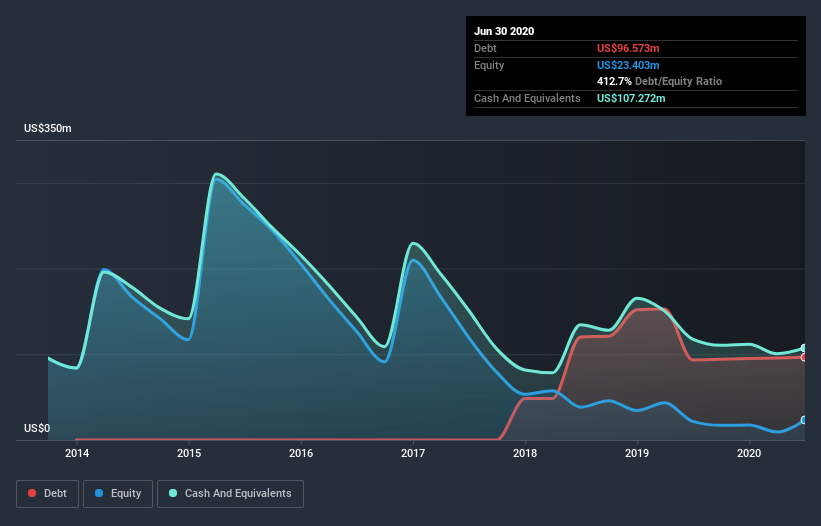
Howard Marks put it nicely when he said that, rather than worrying about share price volatility, 'The possibility of permanent loss is the risk I worry about... and every practical investor I know worries about.' It's only natural to consider a company's balance sheet when you examine how risky it is, since debt is often involved when a business collapses. We can see that Puma Biotechnology, Inc. (NASDAQ:PBYI) does use debt in its business. But the more important question is: how much risk is that debt creating?
Why Does Debt Bring Risk?
Debt assists a business until the business has trouble paying it off, either with new capital or with free cash flow. If things get really bad, the lenders can take control of the business. However, a more common (but still painful) scenario is that it has to raise new equity capital at a low price, thus permanently diluting shareholders. Of course, plenty of companies use debt to fund growth, without any negative consequences. The first step when considering a company's debt levels is to consider its cash and debt together.
See our latest analysis for Puma Biotechnology
What Is Puma Biotechnology's Debt?
The chart below, which you can click on for greater detail, shows that Puma Biotechnology had US$96.6m in debt in June 2020; about the same as the year before. However, it does have US$107.3m in cash offsetting this, leading to net cash of US$10.7m.

How Healthy Is Puma Biotechnology's Balance Sheet?
According to the last reported balance sheet, Puma Biotechnology had liabilities of US$94.5m due within 12 months, and liabilities of US$145.9m due beyond 12 months. Offsetting these obligations, it had cash of US$107.3m as well as receivables valued at US$24.0m due within 12 months. So it has liabilities totalling US$109.2m more than its cash and near-term receivables, combined.
While this might seem like a lot, it is not so bad since Puma Biotechnology has a market capitalization of US$418.2m, and so it could probably strengthen its balance sheet by raising capital if it needed to. But it's clear that we should definitely closely examine whether it can manage its debt without dilution. While it does have liabilities worth noting, Puma Biotechnology also has more cash than debt, so we're pretty confident it can manage its debt safely. The balance sheet is clearly the area to focus on when you are analysing debt. But it is future earnings, more than anything, that will determine Puma Biotechnology's ability to maintain a healthy balance sheet going forward. So if you want to see what the professionals think, you might find this free report on analyst profit forecasts to be interesting.
In the last year Puma Biotechnology had a loss before interest and tax, and actually shrunk its revenue by 16%, to US$241m. We would much prefer see growth.
So How Risky Is Puma Biotechnology?
Statistically speaking companies that lose money are riskier than those that make money. And in the last year Puma Biotechnology had an earnings before interest and tax (EBIT) loss, truth be told. And over the same period it saw negative free cash outflow of US$11.4m and booked a US$41.6m accounting loss. With only US$10.7m on the balance sheet, it would appear that its going to need to raise capital again soon. Overall, we'd say the stock is a bit risky, and we're usually very cautious until we see positive free cash flow. There's no doubt that we learn most about debt from the balance sheet. But ultimately, every company can contain risks that exist outside of the balance sheet. For instance, we've identified 3 warning signs for Puma Biotechnology that you should be aware of.
At the end of the day, it's often better to focus on companies that are free from net debt. You can access our special list of such companies (all with a track record of profit growth). It's free.
When trading Puma Biotechnology or any other investment, use the platform considered by many to be the Professional's Gateway to the Worlds Market, Interactive Brokers. You get the lowest-cost* trading on stocks, options, futures, forex, bonds and funds worldwide from a single integrated account. Promoted
New: Manage All Your Stock Portfolios in One Place
We've created the ultimate portfolio companion for stock investors, and it's free.
• Connect an unlimited number of Portfolios and see your total in one currency
• Be alerted to new Warning Signs or Risks via email or mobile
• Track the Fair Value of your stocks
This article by Simply Wall St is general in nature. It does not constitute a recommendation to buy or sell any stock, and does not take account of your objectives, or your financial situation. We aim to bring you long-term focused analysis driven by fundamental data. Note that our analysis may not factor in the latest price-sensitive company announcements or qualitative material. Simply Wall St has no position in any stocks mentioned.
*Interactive Brokers Rated Lowest Cost Broker by StockBrokers.com Annual Online Review 2020
Have feedback on this article? Concerned about the content? Get in touch with us directly. Alternatively, email editorial-team@simplywallst.com.
About NasdaqGS:PBYI
Puma Biotechnology
A biopharmaceutical company, focuses on the development and commercialization of products to enhance cancer care in the United States and internationally.
Outstanding track record with flawless balance sheet.
Similar Companies
Market Insights
Community Narratives





